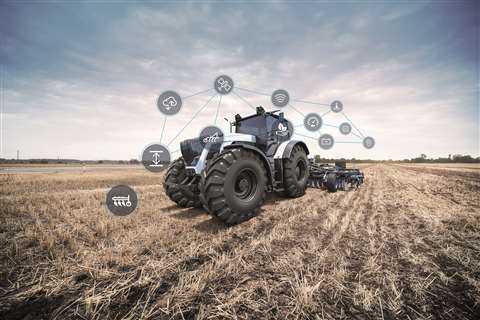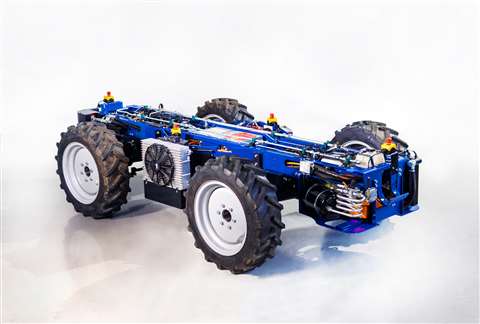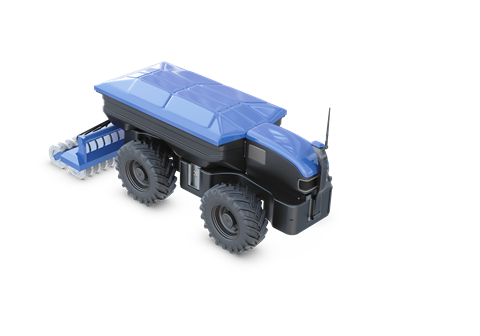AVL develops specialist powertrain solutions
03 March 2023
 Intelligent vehicles monitor vehicle condition and performance (Photo: AVL)
Intelligent vehicles monitor vehicle condition and performance (Photo: AVL)
From its headquarters in Graz, Austria, and with support from a worldwide network of technology centres, AVL specialises in the ground-up development of mobility systems using the latest power technologies, including battery-electric and hybrid powertrains, hydrogen internal combustion engines and fuel cells. Expertise extends from power delivery through to drivetrain functionality, supported by in-depth knowledge of related components and subsystems.
AVL is involved in projects for most vehicle types, including passenger cars, light- and heavy-goods vehicles, and off-highway machines used across construction, agriculture and other sectors. The scope of projects ranges from the design and incorporation of individual components, through to the development of complete powertrains. But with any project, the end goal is to deliver a sustainable solution which both cuts costs and improves vehicle efficiency.
Intelligent automation
In an exclusive interview with DPI, Ronald Kruth, business development manager, Off-Highway, said that the megatrend of an increasing global population and the need to support those people with food, housing and related infrastructure are pushing OEMs to prioritise machine efficiency. For this, AVL will leverage intelligent automation, while decarbonisation of the associated machines can reduce the environmental impact.
“More stringent exhaust emissions legislation is coming into effect all around the world,” he noted. “These regulations have a disproportionate impact on OEMs, as they are required to develop vehicles which comply with the new legislation. To justify that additional cost of an advanced aftertreatment system or a completely new propulsion system, the vehicles need to have functions and features which add value for the customer.
“Although there’s no CO2 legislation in place of the off-highway machine industry, manufacturers are still investing in decarbonisation of their products, where technically feasible, to reduce the immediate impact and also prepare for any future legislative changes.”
Kruth said that it is critical for AVL to take a broad view of technology trends at a very early stage, as this can mean no option is off the table when discussing a customer project. The company is not bound to any tech or products, allowing the best solution to be selected for the given application.
That said, there are still underlying factors which must be taken into account. Kruth: “For sure, homologation- or legislation-relevant requirements prevail. But it is still challenging to balance all other requirements coming from the different departments, like product management, industrialisation, purchasing and engineering etc., because there is always a trade-off between performance and cost.”
AVL can offer a broad portfolio of solutions delivered from a series of suppliers, a setup which helps with successfully addressing those trade-offs. From initial consultation through to start of production, project contributions can be tailored according to individual needs. This can vary, from single-part solutions through to turnkey projects.
“In a given development project, we work with the existing suppliers delivering to our customers. Or we help them to implement new suppliers, if needed,” said Kruth.
 Modular electric platforrm (Photo: AVL)
Modular electric platforrm (Photo: AVL)
Continuing, he said that dependent on the maturity level of selected subsystems, development of a powertrain project from scratch can take between two and four years. Over the development period AVL acts as an engineering partner; the company does not supply any related hardware, nor does is carry out any contract manufacturing. Part type approval is managed by the individual suppliers.
The company does, though, have a comprehensive testing capability to support powertrain development. This starts with virtual validation involving Software in the Loop (SiL), Model in the Loop (MiL) and Hardware in the Loop (HiL), through to final vehicle testing. Based on anticipated finished volumes, the development approach can be adapted to balance related R&D efforts and associated risk.
New power
In the case of off-road powertrains, Kruth noted that there is a growing demand for proof-of-concept supporting the decision to use a hydrogen fuel system (either internal combustion or fuel cell). That is still balanced by onboard fuel storage technology and hydrogen fuel infrastructure, which still has to catch up with powertrain tech.
Elsewhere, small and compact machines are now tending to use pure battery-electric solutions. Medium-size machines are featuring IC/electric hybrid powertrains, so as to deliver the power and efficiency needed in a single package. While diesel still dominates for powering larger equipment, an eCVT transmission can help to improve overall performance, both in terms of fuel economy and operator efficiency.
 Autonomous vehicle - intelligent automation will be a key field of innovation (Photo: AVL)
Autonomous vehicle - intelligent automation will be a key field of innovation (Photo: AVL)
AVL has a series of locations around the globe dedicated to development of autonomous vehicle systems. Asked whether these will make their way into commercial vehicles or off-highway machines, Kruth noted that there are already a series of examples in the agricultural sector where autonomy is used to improve operational efficiencies.
“There are new types of vehicles for vine and orchard farming which demonstrate some autonomous capability, through to complete self-operation,” said Kruth. “There are also autonomous vehicles in fenced mining operations. From the AVL perspective, intelligent automation will be a key field of innovation.”
While the current powertrain market is driven by matching the ideal solution to the intended application, Kruth said that there are some approaches which are now largely outdated. “Inefficient solutions which put the focus on pure cost reduction are no longer viable. From our perspective, future off-road powertrains must meet ecological and economic requirements at the same time.
“We spend about 12% of our turnover on internal R&D projects to support development of innovative solutions for future powertrains.”
STAY CONNECTED




Receive the information you need when you need it through our world-leading magazines, newsletters and daily briefings.
POWER SOURCING GUIDE
The trusted reference and buyer’s guide for 83 years
The original “desktop search engine,” guiding nearly 10,000 users in more than 90 countries it is the primary reference for specifications and details on all the components that go into engine systems.
Visit Now
CONNECT WITH THE TEAM










